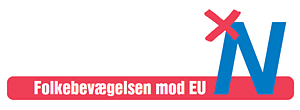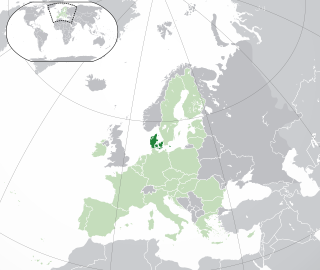
Venstre, full name Venstre, Danmarks Liberale Parti, is a conservative-liberal, agrarian political party in Denmark. Founded as part of a peasants' movement against the landed aristocracy, today it espouses an economically liberal, pro-free-market ideology.
The Conservative People's Party, also known as The Conservatives is a centre-right political party in Denmark. The party is a member of the European People's Party (EPP) and International Democrat Union (IDU).
The Red–Green Alliance or Unity List is an eco-socialist political party in Denmark. It was founded in 1989 with the merger of three Marxist parties and it is the furthest left-wing party in the Danish parliament, where it advocates for an expansion of welfare and social justice as well as socialist transformation in Denmark and internationally. During the 2021 Copenhagen City Council election the party placed first in the Danish capital Copenhagen, with 24.6% of the votes. The party is also active in various Danish trade unions.

The People's Movement against the EU is a political association in Denmark against the European Union. It was founded in 1972 as a cross-party campaign platform for a 'no' vote in Denmark's referendum on EEC membership. The People's Movement was represented in the European Parliament from 1979 until 2019, when it lost its single seat in the European Parliament election.

Dan Jannik Jørgensen is a Danish politician of the Social Democrats who has been serving as Ministry for Development Cooperation and Global Climate Policy in the government of Prime Minister Mette Frederiksen since 2022.

Kristian Thulesen Dahl is a Danish director and former politician who served as Leader of the Danish People's Party (DPP) from 2012 to 2022. He was a Member of the Folketing (MF) from September 1994 until July 2022, first representing Fremskridtspartiet until 6 October 1995 and then the DPP from that date until 29 June 2022, when he became an independent.

Jeppe Sebastian Kofod is a former Danish politician of the Social Democratic Party who served as Minister of Foreign Affairs of Denmark between 27 June 2019 to 15 December 2022.

The politics of Denmark take place within the framework of a parliamentary representative democracy, a constitutional monarchy and a decentralised unitary state in which the monarch of Denmark, King Frederik X, is the head of state. Denmark is a nation state. Danish politics and governance are characterized by a common striving for broad consensus on important issues, within both the political community and society as a whole.

Mette Frederiksen is a Danish politician who has served as prime minister of Denmark since June 2019, and leader of the Social Democrats since June 2015. The second woman to hold either office, she is also the youngest prime minister in Danish history, the first to be born after Margrethe II's accession to the throne, and the first to serve under Frederik X.

Denmark in the European Union refers to the historical and current issues of Denmark's membership in the European Union (EU). Denmark has a permanent representation to the EU in Brussels, led by ambassador Jonas Bering Liisberg.

The 2014 European Parliament election in Denmark was an election held in Denmark on 25 May 2014 to decide who would represent Denmark in the European Parliament (EP) from 2014 to 2019. The Danish People's Party with 26.6% of the votes became the largest party for the first time in a nationwide Danish election.

General elections were held in the Kingdom of Denmark on 5 June 2019 to elect all 179 members of the Folketing; 175 in Denmark proper, two in the Faroe Islands and two in Greenland. The elections took place ten days after the European Parliament elections.

The Alternative is a green political party in Denmark. The party was publicly launched on 27 November 2013 by former Minister of Culture Uffe Elbæk and Josephine Fock; Elbæk had been a parliamentarian for the Social Liberal Party. Elbæk was the leader of the party until February 2020, where he stepped down and was succeeded by Fock. Currently the party is led by Franciska Rosenkilde. It collaborates with DiEM25 at the European level.

Euroscepticism is a minority view in Ireland. Opinion polls held in the country between 2017 and 2022 indicated between 70% and 90% support for continued membership of the European Union (EU), and a 2021 'Eurobarometer' report indicating that 75% of poll respondents had a "positive image of the EU".

General elections were held in the Kingdom of Denmark on 1 November 2022, except in the Faroe Islands, where they were held on 31 October as 1 November was a national day of mourning for victims at sea. Of the 179 members of the Folketing, 175 were elected in Denmark proper, two in the Faroes and two in Greenland. The elections were called on 5 October following an ultimatum to the government by the Social Liberals due to the outcome of a report on the 2020 Danish mink cull by the Mink Commission, which was critical of the government. Voter turnout was 84% in Denmark, 48% in Greenland, and 71% in the Faroes, with a combined turnout of 84% for the realm as a whole.

The 2019 European Parliament election in Denmark was held on 26 May 2019, and elected the Danish members to the European Parliament. The elections are part of the EU-wide elections for the parliament. Denmark had 13 seats in parliament, which increased by one additional seat following Brexit.

A referendum on the abolition of the defence opt-out, one of the country's opt-outs from the European Union, was held in Denmark on 1 June 2022. The referendum was announced on 6 March 2022 following a broad multi-party defence agreement reached during the 2022 Russian invasion of Ukraine. The referendum resulted in the "Yes" side winning with approximately two-thirds of the vote.

Volt Denmark is a social liberal political party in Denmark and the national chapter of the pan-European movement Volt Europa.
The Denmark Democrats is a right-wing populist political party in Denmark. The party was founded in June 2022 by Inger Støjberg, and is officially titled Denmark Democrats – Inger Støjberg. The party is currently in opposition to the second Frederiksen government.

The Frederiksen II Cabinet is the current Government of Denmark, which took office on 15 December 2022. It succeeded the Frederiksen I Cabinet following the 2022 general election.

















